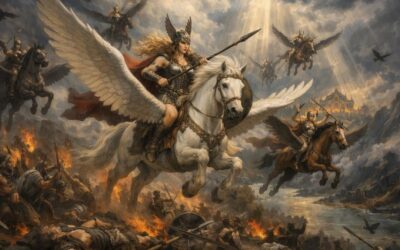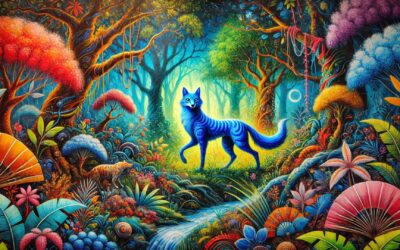The Magic Paintbrush
Once upon a time, there lived a young boy named Ma Liang with a humble heart and a boundless passion for painting. However, his family was poor, and he could barely afford a simple brush. Ma Liang practiced diligently by drawing in the sand and on the walls with a stick. His talent was undeniable, yet his dreams seemed destined to be just that – dreams.
One night, as Ma Liang drifted to sleep, an old man with a flowing white beard appeared in his dreams. “Your heart is pure, and your spirit is strong,” the old man declared. “I bestow upon you this magic paintbrush. Use its power wisely.” Ma Liang awoke with a start. There, beside him, lay a paintbrush so magnificent it seemed to glow with an otherworldly light.
At first, Ma Liang hesitated, unsure of how to wield such immense power. His compassionate heart moved him to use it for good. When he saw a hungry farmer, he painted a steaming bowl of rice. When he encountered a shivering elderly woman in tattered clothes, a warm, beautiful coat blossomed beneath his paintbrush. News of the magic paintbrush spread, bringing both wonder and admiration.
But power can corrupt even the kindest of souls. The greedy emperor heard tales of Ma Liang’s magical gift and summoned the young artist to his opulent palace. The emperor demanded riches: mountains of gold, flocks of exotic birds, all conjured from Ma Liang’s imagination. The boy refused. Ma Liang knew using his gift for selfish gain was a betrayal of its true spirit.
Enraged, the emperor locked Ma Liang away. Yet, even from his prison cell, the boy’s spirit was unbroken. He hatched a plan. Appeasing the emperor, he painted the most breathtaking landscape the emperor had ever seen – complete with a sparkling sea. Delighted, the emperor demanded a boat so he could sail away on this magnificent ocean.
Ma Liang painted a grand ship. The emperor, blinded by greed, rushed onto the vessel, followed by his men. Ma Liang seized his moment. With a flick of his brush, he painted a mighty storm, whipping the waves and tossing the boat like a mere toy. The emperor and his greedy followers were never seen again.
Unveiling the Wisdom
“The Magic Paintbrush” whispers lessons that echo down through centuries:
- The Power of Giving: Our true potential lies not in taking but in offering what we have to ease the suffering of others.
- Gifts Come with Responsibility: Talent, power, or any extraordinary gift demands careful use, or else it can twist into something destructive.
- Humility Over Greed: The most valuable treasures, like inner peace and compassion, can’t be painted with any brush or gained through riches.
Keep the Magic Alive
The story of Ma Liang invites us to reflect on our actions. Do you use your special talents, whatever they may be, to create something beautiful in the world? Are you mindful of how your choices affect others?
Let’s explore further:
- Research other Chinese myths and legends – the world is full of incredible stories waiting to be discovered!
The magic of myths lies in their ability to transcend time and continue to spark our imagination. Share this tale – or a myth you love – with someone today!
Why Should You Care?
- Exploring Different Cultures: Myths like “The Magic Paintbrush” offer a window into the beliefs, values, and creative imagination of cultures worldwide.
- Timeless Wisdom: Myths often contain profound truths about human nature presented in an engaging, memorable way. They spark reflection on how we live and the choices we make.
- Universal Themes: Even stories from long ago and far away resonate with us today. Myths highlight shared human struggles and aspirations, reminding us of our interconnectedness.
Key Takeaways
- True wealth lies in kindness and using your gifts for good, not in material possessions.
- Any power – talent, influence, or even technology – should be used with wisdom and responsibility.
- Greed and selfishness ultimately lead to downfall.
Keywords and Definitions
- Myth: A traditional story with symbolic meaning, often explaining the origins of the world, natural phenomena, or cultural practices.
- Legend: A story handed down through generations, usually with some basis in history, featuring heroes or extraordinary events.
- Ancient China: Historical period spanning multiple dynasties, known for rich culture, philosophy, and technological innovations.
- Emperor: The supreme ruler of an empire, often depicted in myths as powerful but also subject to human flaws like greed.
- Magic: Supernatural powers or forces that defy ordinary laws of nature, a common element in myths and legends.
- Kindness: The quality of being compassionate towards others, a recurring virtue celebrated in myths.
- Greed: Excessive desire for wealth or possessions, often depicted in myths as leading to negative consequences.
- Responsibility: Accountability for one’s actions and the obligation to use power or influence in an ethical way.
- Symbolism: Using objects or events in a story to represent abstract ideas or concepts.
- Folklore: Traditional customs, beliefs, and stories preserved within a specific community or culture.
Frequently Asked Questions
- Where can I find more Chinese myths and legends? Many resources are available online or in libraries. Research collections of Chinese folktales for more delightful stories.
- Are there any similar myths to ‘The Magic Paintbrush’ from other cultures? Yes! Themes about magical creation and the dangers of misuse of power appear in myths worldwide.
Myth Buster
- Myth: Myths are just silly made-up stories. Reality: Myths hold cultural wisdom, give shape to a people’s worldview, and provide a lens for ethical reflection.
Let’s Talk
- Do you have a favorite myth from your own culture or a different one? What makes it special to you?
- Can you think of modern stories (movies, books, etc.) that echo themes found in traditional myths?
- If you had a magic paintbrush, what’s the first thing you would paint to help someone in need?
Let the conversation flow – share your thoughts in the comments below!










0 Comments